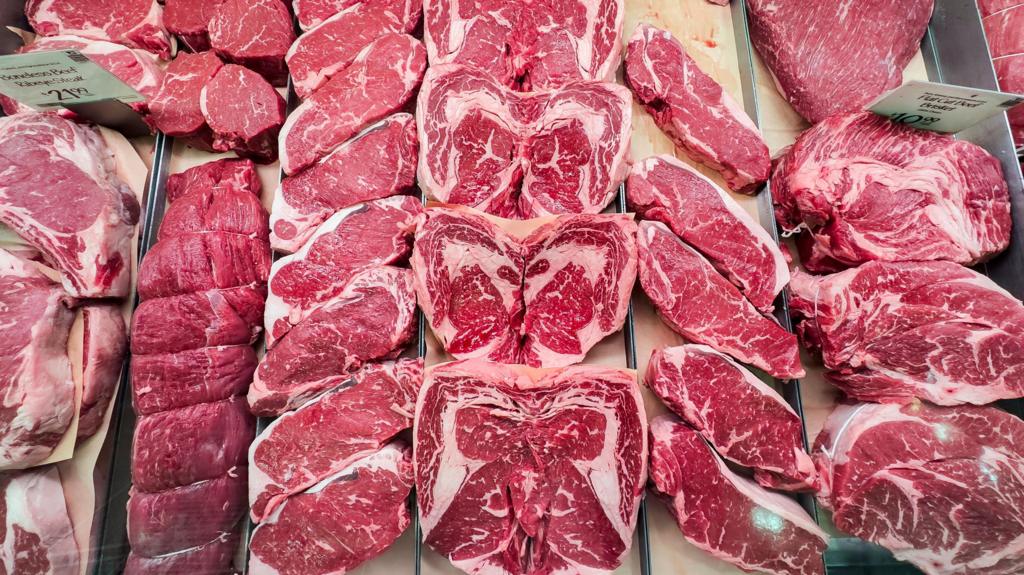“`html
Former US President Donald Trump has called on the Justice Department to investigate meat-packing companies, alleging their potential role in inflating beef prices.
In a social media post, Trump accused the industry of contributing to elevated beef costs for American consumers “through Illicit Collusion, Price Fixing, and Price Manipulation”.
His request for an investigation, focused on potential antitrust violations, comes amid rising beef prices that have become a political concern, potentially undermining his pledges to reduce food costs in the US.
The announcement also follows Republican losses in recent key elections, where voters’ anxieties about the cost of living and Trump’s economic stewardship influenced the outcome.
Trump has placed beef prices at the forefront of his discourse on the cost of living and food inflation. However, his recent proposals to alleviate prices have faced opposition from ranchers.
Last month, he urged US ranchers via social media to lower cattle prices, subsequently drawing criticism for suggesting increased beef imports from Argentina, potentially quadrupling US purchases.
At the time, ranchers expressed concerns that some of his proposed solutions could hinder their livelihoods without significantly impacting grocery store prices.
As Trump persists in his efforts to lower beef prices for American consumers, his latest call for a federal investigation signals a possible shift in focus towards the meat-packing industry, responsible for livestock slaughter, processing, and meat packaging.
“We will always protect our American Ranchers, and they are being blamed for what is being done by Majority Foreign Owned Meat Packers, who artificially inflate prices, and jeopardize the security of our Nation’s food supply,” Trump stated in his social media post.
Retail prices for beef mince increased by 12.9% in the 12 months leading up to September, while beef steaks saw a rise of 16.6%, according to government data released in October.
A pound of ground chuck, a richer mince derived from the neck and shoulder of cattle, now averages $6.33 (£4.75), compared to $5.58 a year prior.
These increases notably exceeded the general food inflation rate, which stood at 3.1%.
Some economists attribute the high prices to supply constraints coupled with strong beef demand.
The country’s cattle inventory has reached its lowest point in nearly 75 years. Decades of contraction in the industry have been exacerbated by several years of drought, compelling ranchers to reduce herd sizes, which require several years to replenish.
However, others contend that the US government could lower beef prices by addressing the market dominance of a few companies in meat processing.
Currently, just four firms control over 80% of the beef slaughtering and packing market. These meat processing firms—Tyson, JBS, Cargill, and National Beef—have faced multiple lawsuits, including one filed by McDonald’s alleging collusion to inflate beef prices.
Consolidation within the meat processing industry has garnered bipartisan scrutiny.
The Biden administration issued an executive order directing agencies to address corporate consolidation across the food supply chain, though Trump revoked that order earlier this year.
Former President Joe Biden also directed the Agriculture Department to investigate major meat packers, accusing the firms of raising prices and increasing their profits during the pandemic.
Thousands of flights are at risk just before Thanksgiving.
The country hasn’t been able to curb an outbreak of more than 5,000 cases over the last year, while US cases are at a 33-year high.
Parts of El Paso that were once teeming with migrants now lay largely silent as border crossings hit a 50-year low.
The fountaining event lasted for nearly five hours and was the 36th volcanic episode since December 2024.
The court rejected an appeal from a clerk who was ordered to pay compensation to a same-sex couple after refusing to grant a marriage licence.
“`

